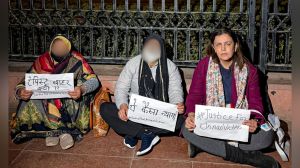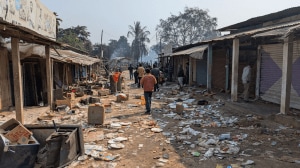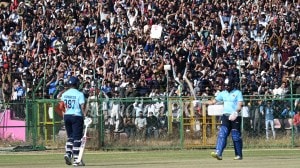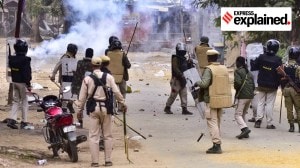A PM in exile
The Sunday Express spent a day with Lobsang Sangay to know how a Prime Minister without a country spends his day as he works to take forward the decades-old Tibetan movement
He starts his day by preparing a cup of coffee for himself,comes back from work and opens the door to his three-room apartment,draws a monthly salary of 300 USD about Rs 16,000,works for around 18 hours a day. He is Lobsang Sangay,the Harvard-educated Prime Minister of the Tibetan government-in-exile,the political successor to the 14th Dalai Lama Tenzin Gyatso who renounced his political authority in March this year.
The house that he shares with a friend isnt exactly a Prime Ministers residencetwo small bedrooms,a living room,a small balcony and a kitchenbut then,Sangay is no ordinary head of state either. The 43-year-old Sangay is prime minister without a country,yet for tens of thousands of Tibetans in exile,he is the man who gives the movement the legitimacy they need to take on China.
I will not say that His Holiness the Dalai Lama transferred his powers to me; rather it is the continuation of the same set up and I am a part of it. It is a challenging task for me to take the Tibetan struggle forward. The Tibetans look up to me in their struggle to get back home,which we shall definitely achieve, Sangay says.
Like many fellow Tibetans in exile,Sangay has never been to Tibet. He grew up in Darjeeling,went to Harvard and came back to Dharamshala to head the government. But now,he dreams of going to Tibet and meeting his only surviving paternal uncle. His family had fled Tibet in the late 1950s-early 60s and his father,a monk,was among those who had taken up arms against the Chinese Army. During their escape,his grandfather and an uncle were killed while a pregnant aunt committed suicide. Another of his uncles was forced to return to Tibet. My uncle last spoke to me in 2008,and expressed a wish to see my family and me. I want to fulfill his wish, he says.
After his early years at the Tibetan Refugee School in Darjeeling,Sangay did his B.A. Hons and LL.B. from the University of Delhi. In 1995,he won a Fulbright Scholarship to Harvard Law School,where he did his masters in Law. He is widely respected as an expert in international law and conflict resolution. While in Harvard,he organised several major conferences with Chinese,Tibetan,Indian and Western scholars and facilitated two meetings between the Dalai Lama and Chinese scholars.
Sangays day begins at 6.30 a.m.,when he gets up and prepares a cup of coffee for himself. He has no domestic helps at home,only a cook who prepares his lunch and brings it in a tiffin box to his office in Dharamshala,Himachal Pradesh. Sangay says he likes to cook,whenever he gets time. I am not a very good cook,but yes,I make breakfast and can cook some Tibetan,Indian and American dishes, he says. Not many Prime Ministers can claim such culinary range.
His special interests: mutton and chicken biryani,Katrina Kaif movies and 20-20 cricket.
I like sipping my coffee in my balcony,taking in the view of the Kangra valley, he says. While he does that,he also prepares a mental note of the days itinerary. Coffee done,Sangay walks the treadmillinstalled in the living room of his apartmentfor 30 minutes and follows it up with some stretching exercises. After his American breakfast of toast,eggs and coffee,Sangay is ready to leave for work by 8.30 a.m. Today,he is dressed in a white Tibetan shirt.
His official vehicle is a 2007 model Ambassador. There are no escort vehicles,no beacon atop the vehicle and no hooters. Sangays security guard joins him in his officeabout a few hundred metres from his official residenceand stays with him while he is at work.
Work begins at 9 a.m.,when he is first briefed about his days appointments by his Personal Secretary Jigme Namgyal. After Jigmes briefing,Sangay turns his attention to his iMac,reading online editions of newspapers and checking his mails for about 30-40 minutes,before meeting visitors at 10 a.m.
His office is simple. There are no air-conditioners; only three ceiling fans,two three-seater sofas,a small meeting table and his personal table,which is piled with official documents and books on Tibetan literature. Next to this is a small closet on which idols of Tibetan gods are placed. A life-size portrait of the Dalai Lama hangs from the wall,right next to his chair. His office has a small balcony overlooking the valley and the Tibetan parliament building,where he likes to takes a break.
During the day,Sangay walks down to offices of his ministers,discussing their departments. His thrust these days is on improving education among exiled Tibetans. Our emphasis is on educating young Tibetans so that they can lead their lives with ease. In fact,there are over 40 schools,which are being run by Tibetan NGOs and the government for Tibetan children in Tibetan settlements,across the country and even abroad, says Sangay.
Lunch is between 1.30 p.m. and 2 in a conference room next to Sangays office in the newly constructed parliament building. Members of Sangays Cabinet Kashag join him for lunch,during which they discuss their policies and future plans,followed by a formal meeting in the Cabinet meeting room,located on the same floor of the building.
After the Cabinet meeting,Sangay has a sheaf of official documents to sign. To make it a legal document or a government notification,Sangay has to sign on the top right end of a page; not at the end of the note. Sangay uses a Rs 20 Pilot pen; no Mont Blancs or Sheaffers for the Prime Minister.
Nobody who comes to meet the Prime Minister goes back disappointed. Sangay ensures that he meets everybody,posing for group photographs and holdings meetings with visitors. There are times when I keep sitting in my office till 8.30 p.m. or 9 p.m. to hear people. We are a family here and ever since I have been given this responsibility by His Holiness to serve Tibetans and take their struggle forward,it becomes even more important for me to meet people and hear their grievances, says Sangay.
Today,he is ready to leave around 7 p.m. and picks up some English newspapershis newspaper reading is usually at night. Back home,he does some stretching exercises for 30 minutes before hitting the dinner table.
Sangay shares his apartment with his friend from his Delhi University days,Kaydor Aukatsang,a Tibetan from San Francisco who moved to India to help Sangay with his work. My friend and I have been together since our DU days. We worked together in the United States too,and now both of us have left our families behind in the US to come to Dharamshala to take the Tibetan cause forward. My wife and my four-and-a-half-year-old daughter live in Boston,United States, says Sangay.
Its time for the Prime Minister to call it a day and he leaves the most important part of the day for the lastcalling up his wife and daughter in the US.
- 01
- 02
- 03
- 04
- 05































